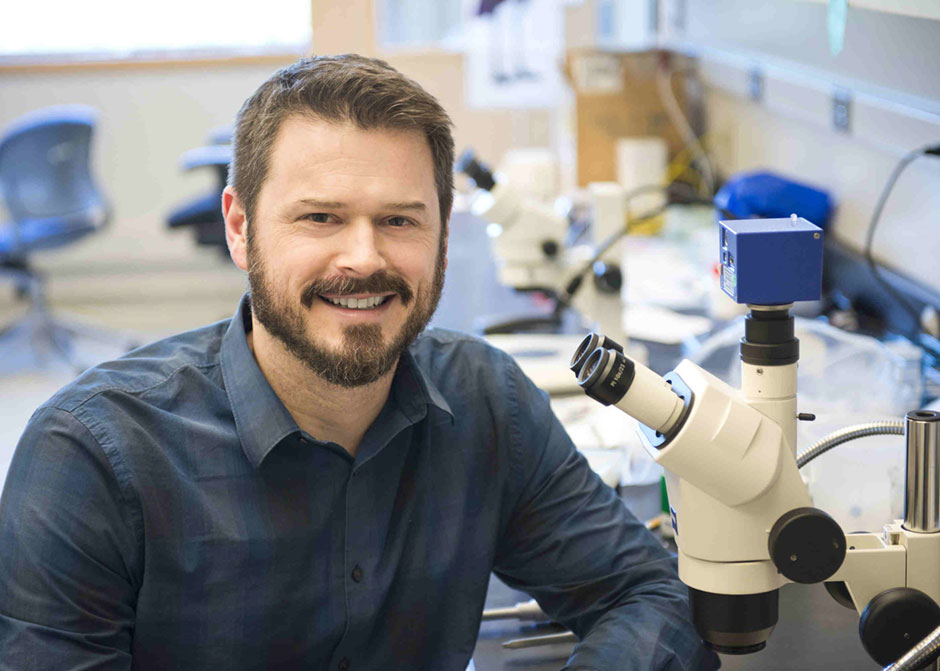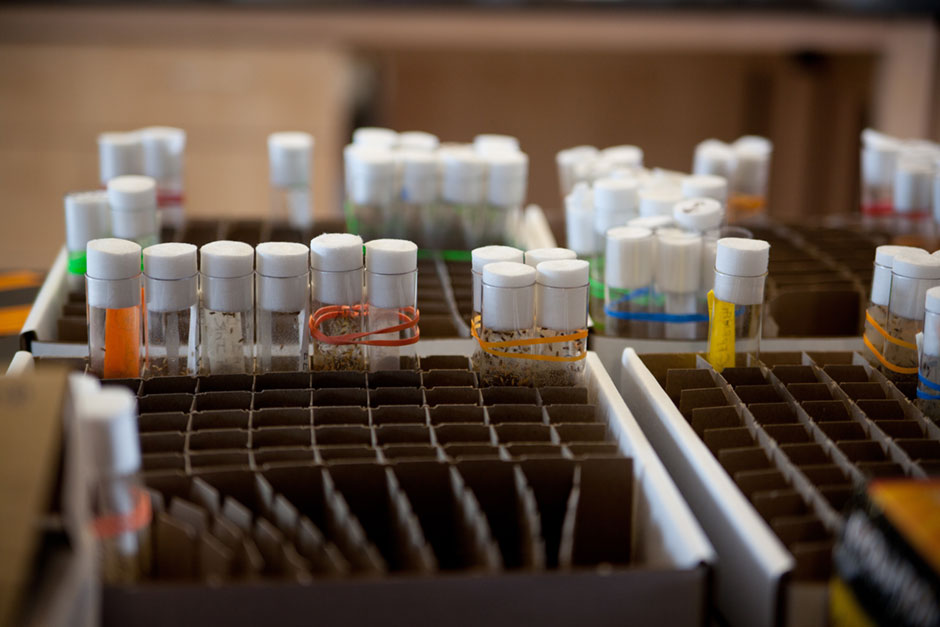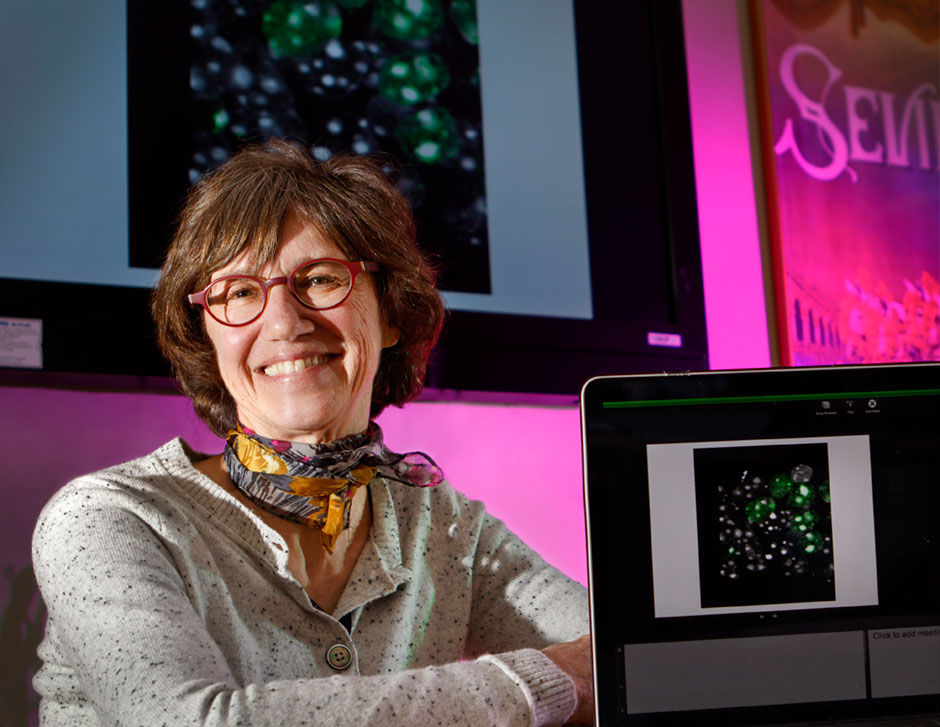Why do neurons die?
That was what OHSU’s Marc Freeman wondered, years ago. Freeman — then a professor of neurobiology at the University of Massachusetts Medical School, and first and foremost a basic scientist — understood that traumatic brain injury, Alzheimer’s and Parkinson’s disease all result from the degeneration of neurons.
But he wasn’t initially thinking about that. Rather, he was driven by an interest in basic science: why do neurons fall apart? Might they actively destroy themselves? And are there ways we can prevent that from happening?
The scientific path that Marc Freeman has taken since those simple questions has been remarkable. He became an esteemed Howard Hughes Medical Institute Investigator, and in 2016 the director of OHSU’s world-renowned Vollum Institute. He’s become an international leader in providing a clear molecular understanding of how neurons, after injury or in disease, actually drive their own demise. And he’s identified key drug targets that are being used to block degeneration after injury and in neurodegenerative disease.
Freeman’s scientific path has been remarkable for another reason. It shows how exploring important questions in basic science can become so important to human health.

The fundamental building blocks of life have remained the same through eons – from bacteria to bugs to humans. Basic scientists try to understand at a deep level, and in a variety of organisms, how genes, molecules, and cells work together to allow the diversity of organisms in our world to thrive and interact with their environment.
Basic scientists can work for years and years on what might seem like idiosyncratic questions — like, why do fruit flies seem to sleep at night? The questions basic scientists ask span the evolutionary ladder from top to bottom. In the example of fruit flies, the genes a fruit fly uses to cycle through day/night rhythms are the very same genes used by humans. The discovery in the “model organism” (the fruit fly) allowed scientists to make that fundamental advance.
So, while basic scientists don’t often get the attention given to applied scientists — the scientists who focus their research programs on trying to find treatments for specific diseases such as Alzheimer’s, for example – their work is just as important.
Across OHSU, pioneering neuroscientists are asking — and answering — basic science questions about our brains and nervous systems. How do simple brains, like those in flies, zebrafish or mice, work? Using a dizzying array of sophisticated new technology, OHSU neuroscientists are helping to lead a renaissance of basic science. And they are changing how we understand the brain.
Nerves fall apart
Several years ago, Freeman became interested in what happens to a nerve after it gets injured. Nerves are composed of the long slender fibers (axons) of neurons that connect different parts of the nervous system, much like wires connect different parts of a computer. In patients, nerve injury can break these connections and lead to devastating effects, like losing the use of limbs or, in the case of traumatic brain injury, dramatic changes in our ability to think or remember or even changes in personality.
Freeman’s group decided to try to study how nerves fall apart by removing antennae from the heads of fruit flies, and then observing the nerve. That work led to Freeman’s discovery of the first so-called “axon death” molecule, whose normal function is to drive the destruction of axons.
The purpose of the molecule is to remove damaged axons after they are injured. But the molecule can become inappropriately activated after severe injury or in neurodegenerative disease.

Remarkably, when Freeman’s team blocked the action of that molecule, “neurons that were injured did not degenerate. In fact, it was as if they had never been injured at all,” Freeman says. “It was really surprising, and a bit hard to believe.”
Here’s what that discovery could mean: If scientists can synthesize a drug to block the action of that molecule, the world could have a treatment for a range of neurodegenerative problems and disease: traumatic brain injury, Alzheimer’s and Parkinson’s disease, stroke and others.
The engine that drives science, treatment, cures
“The engine that drives the advancement of clinical care is basic research,” Freeman said. “What do I mean by that? Basic research is discovery-based science that aims to advance our understanding of how biological systems work.”
“The overarching idea is this,” Freeman said. “If we are able to understand how a biological event works, we can apply that knowledge to intervene and block it. Diseases generally happen because there is some problem with how some physiological mechanism in our bodies are supposed to work. To fix them, we need to understand them.”
“The challenge to basic science has never been greater. Innovative technologies are emerging fast and furiously but there’s less money and fewer people showing interest in the challenges offered by this very demanding profession.”
Gail Mandel, PhD
That understanding can come in strange ways. Like when basic science research helps discover a specific protein that is a key to why we feel pain.
Gail Mandel, a senior scientist at OHSU’s Vollum Institute and an internationally respected neuroscientist, performed basic science research to better understand the functioning of neurons and was the first scientist to postulate that a key protein influenced how humans feel pain. Her team’s theory was confirmed when a family that couldn’t feel pain was discovered. Each of them had mutations in that specific protein.
She and her colleagues have done other research that identified other proteins involved in genetic neuromuscular diseases, and pointed the way toward possible treatments.
“Scientists are driven by curiosity with the goal of discovery,” Mandel says. “And the findings from basic science represent the engine that drives the development of treatment and cures for diseases.”

But basic science is challenging. It can be expensive, and has uncertain returns on investment. Even the successes can take a long time to pay off. Basic scientists are explorers, and they sometimes end up in a dead end.
Nevertheless, the federal government for years recognized basic science as an important investment. The U.S. government, especially through the National Institutes of Health, for decades funded the majority of basic science research in the nation, more than 70 percent in the 1960s and 1970s. But because of the leveling off in federal science spending over the past decade or more, the government’s proportion recently fell below 50 percent for the first time.
“The challenge to basic science has never been greater,” Mandel says. “Innovative technologies are emerging fast and furiously but there’s less money and fewer people showing interest in the challenges offered by this very demanding profession.”
That means that corporate research partnerships —and especially philanthropy — play an increasingly vital role in supporting basic science research. That support enables research leaders like OHSU to retain and recruit top faculty like Freeman and Mandel, use the latest and most powerful scientific equipment, and train scholars and scientists to become tomorrow’s scientific leaders.
That support also provides something else that’s invaluable: it gives scientists the opportunity to explore. Sometimes basic scientists want to explore questions that others aren’t asking. They want to better understand why neurons actually die, while others focus on the results of that death. It can be lonely work. But it also can be exceptionally rewarding for science, and for human health.

